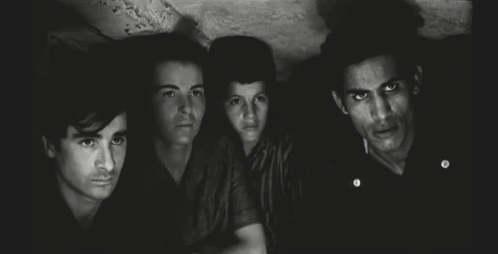
Representing
One of the most iconic films of political decolonization, Pontecorvo’s 1966 Battle of Algiers, has a memorable scene I would like to recall with my reader. Colonel Mathieu, the commander of the colonial forces, discusses with journalists the power of discourse in the midst of the uprising. For Mathieu, the role of activist-intellectuals in the public sphere is diminishing his possibilities of military success. Dismayed by their role and clearly containing his anger, he exclaims: “Why are the Sartres always born on the other side?” After expressing exasperation at how dangerous the existentialist philosopher is as his foe, Mathieu abruptly exits the scene.
In a film full of nuances, the scene leaves very little space for doubt. From the gaze of the colonizer, the radical continental philosopher is seen not only as a contributor to the task of political decolonization, but also runs the risk of becoming naturalized as a born-barbarian (from the colonizer’s perspective a betrayal of civilization seems inconceivable). This naturalization, however, is not innocent. “The Sartres” are made, more times than not, into the representatives of the struggle and emerge as the rational alternative to the colonial status quo. The colonizer’s gaze assumes a battlefield where there are clean, all-encompassing sides: the rightful civilizational project and the subversive radical continental philosophy, the latter appointed as the epistemological representative of political decolonization.
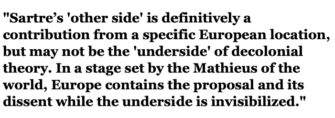
Yet, when we reflect on the radical continental philosopher’s role from what Enrique Dussel calls the “underside of modernity,” doubts undoubtedly emerge. When the tables are turned, the positionality of even the most radical among continental philosophers, Sartre being one example, is questioned. In recounting his personal encounter with Sartre, Edward Said reflects on the silences and paradoxes in Sartre’s political thought. He reads Sartre’s solidarity as “flat,” “innocuous,” “unrewarding” and ultimately “a bitter disappointment to every (non-Algerian) Arab who admired him.” More recently, Algerian Houria Bouteldja completes Said’s reflections. She argues that the limitations that Said rightly recognized were a consequence of Sartre’s reified framework that was unable to leave behind a Eurocentric conception of selfhood. Heir to a continental philosophy that has obscured its situatedness since Descartes, “Sartre did not know how to radically betray his race” (23).
Sartre’s “other side” is definitively a contribution from a specific European location, but may not be the “underside” of decolonial theory. In a stage set by the Mathieus of the world, Europe contains the proposal and its dissent while the underside is invisibilized. In the socially-committed film, the native Arab/Berber resisters are powerfully represented in countless scenes with dark, intense eyes full of rage, portraying the thirst for revolution. But in the few opportunities they have to intervene in the public debate, they are rapidly silenced by legitimized voices. Following the famous postcolonial dictum, they cannot speak and remain largely voiceless.
Christianizing
The attempt to erase the underside is not a problem of the past. In a series of essays published by Al-Jazeera in 2013, Hamid Dabashi and Walter Mignolo interrogated the celebration of another radical continental philosopher, Slavoj Žižek. Confronting the Euro-Marxist oblivion of the universalized claims of his framework, Dabashi asked a pungent question: “Can the non-European Think?” When Mignolo responded in the affirmative, confronting the idea that Europe has the universal monopoly of dissent, he went beyond frameworks of political colonization and entered into the realm of epistemological decoloniality. To understand the reasons for the erasure of the underside it is necessary to explore the patterns of domination that emerged during colonization but nonetheless transcended the context to develop global hierarchies that continue to exist to this day. From the perspective of those on the underside, the “universal radicality” of continental philosophy, represented by Žižek in this case, is premised on the silence and erasure of non-European thinking.
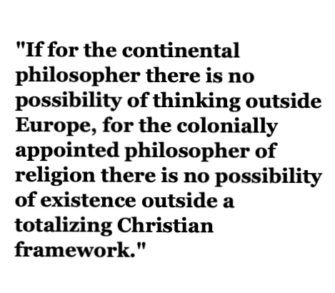 I invite my reader, therefore, to think of the revolutionary representation of radical continental philosophy as a colonially sanctioned dissent that universalizes a provincial difference while invisibilizing the underside of modernity. Coloniality not only monopolizes the only sanctioned path to universal redemption—in what Anibal Quijano calls evolutionism—but also selects its legitimate form of dissent. This is perhaps one of the most perdurable modern strategies of coloniality. In the now famous debate of Valladolid(1550–1551), conceived by critics as one of the most influential legitimizations of early modern racism, the imperial state appointed Euro-Christian theologian-philosophers to discuss “the nature” of Natives. In this discussion, Juan Ginés de Sepúlveda, retrieving Aristotle, offers one of the first modern formulations of biological racism and proposes to forcefully convert Natives into subservient Christians. Bartolomé de las Casas, enthroned as the radical and later liberationist alternative, develops one of the first formulations of cultural racism, insisting on Natives’ adaptability through conversion without physical force. If for the continental philosopher there is no possibility of thinking outside Europe, for the colonially appointed philosopher of religion there is no possibility of existence outside a totalizing Christian framework.
I invite my reader, therefore, to think of the revolutionary representation of radical continental philosophy as a colonially sanctioned dissent that universalizes a provincial difference while invisibilizing the underside of modernity. Coloniality not only monopolizes the only sanctioned path to universal redemption—in what Anibal Quijano calls evolutionism—but also selects its legitimate form of dissent. This is perhaps one of the most perdurable modern strategies of coloniality. In the now famous debate of Valladolid(1550–1551), conceived by critics as one of the most influential legitimizations of early modern racism, the imperial state appointed Euro-Christian theologian-philosophers to discuss “the nature” of Natives. In this discussion, Juan Ginés de Sepúlveda, retrieving Aristotle, offers one of the first modern formulations of biological racism and proposes to forcefully convert Natives into subservient Christians. Bartolomé de las Casas, enthroned as the radical and later liberationist alternative, develops one of the first formulations of cultural racism, insisting on Natives’ adaptability through conversion without physical force. If for the continental philosopher there is no possibility of thinking outside Europe, for the colonially appointed philosopher of religion there is no possibility of existence outside a totalizing Christian framework.
This is one of the legacies of the multiple “1492s.” As Ella Shohat and Robert Stam have shown in their work, and I have also explored, this starts a process in which a diversity of communities were negated, rejected, or invisibilized. Ultimately, most had their humanity put in question and were intertwined as victims of Christian evolutionist genocides. One could think, therefore, that the first step toward decolonizing philosophy of religion would be to contest the Christian frameworks that provide the hegemonic sources of its ontology and epistemology. Some pioneers writing before the current explosion of decolonial philosophy of religion (such as Nelson Maldonado-Torres, Marc Ellis, Salman Sayyid, Tomoko Masuzawa, Gil Anidjar, and Abdulkader Tayob) have called for leaving behind disciplinary frameworks. From distinct standpoints, they challenged the hegemony of Christian schemes, the coloniality of the concept of religion, and/or its secular reiterations. For several of these authors, deeply knowledgeable of religious studies as a discipline, decoloniality delinks from evolutionism because it opens paths toward pluriversality, not toward a new Christian universality with multiple local paths.
While some trends in the field follow this early insight, in many others this impetus is missed. It is not surprising that philosophers of religion continue to privilege Christian frameworks. After all, one of the privileges of coloniality has been universalizing its provincial framework. What we need to interrogate, however, is why several works in decolonial philosophy and theology are repeating some of the same patterns. These works are valuable in other important aspects. Some, for example, offer persuasive challenges to ontological dualism. Yet, they employ frames that more often than not make discourses intelligible insofar as they are expressed within a Christian framework, or its secular reiterations. Either reproducing overt coloniality or its sanctioned dissent, often these proposals inadvertently reproduce the same evolutionism they are formally contesting.
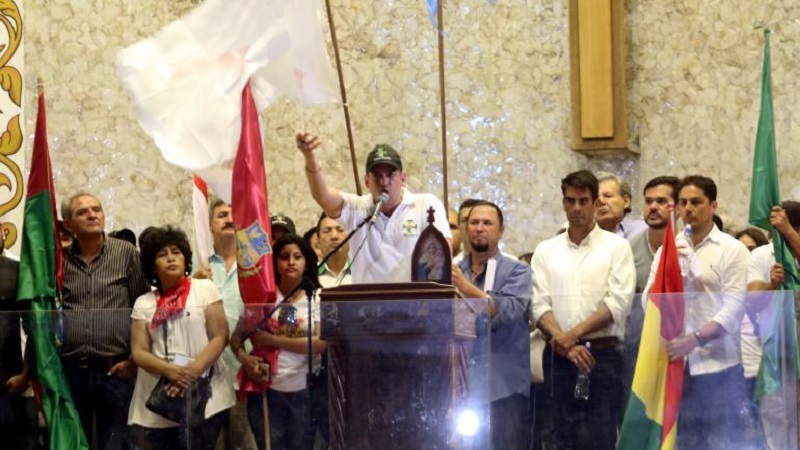
This does not mean we should rule out some forms of Christianity as sources for decolonial knowledges. It is true that Frantz Fanon called Christianity the Church of “the white man” before critiquing the evolutionism of its “calling” to the colonized “not to the ways of God” but “to the ways of the master, the ways of the oppressor” (7). And Mignolo argued that previous radical liberationist projects, that may have called Fanon’s wretched of the earth to other ways, changed “the content but not the terms” of the conversation (92). Yet, current readers of either author may not object to the idea that, as part of a pluriversal project, some self-identified Christian communities in some contexts can depart from systemic fractures, engage critically with the encounter of cosmovisions in their own midst, and ultimately contest evolutionist coloniality. Today, however, philosophers of religion in the American academy often employ Christian frameworks that may not fully address Fanon’s and Mignolo’s concerns.
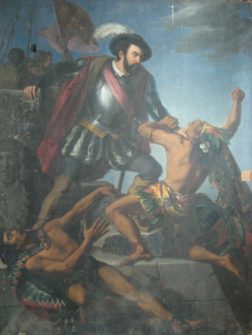
The problem is not necessarily Christianity, but the omnipresence of Christian normativity in discourses of dominance, rebellion, and re-existence. This creates a very narrow setting that reproduces the allure of totalization. In the field, there are some incipient tendencies we may want to interrogate. A first tendency is to follow the critique that the secular is not a neutral space in order to intervene in public debates with normative Christian resources instead of delinking from them. A second tendency is to reify a world religions model, presenting other alternatives as foreign (this time) latecomers to coloniality, thereby making Christian resources the most natural fit for a decolonial project. A final tendency is to universalize an American interpretation of “Christian hybridization,” overlooking the suspicion communities around the world have of hybridity as a strategy that ignores power differentials, sublates knowledges, and enshrines European Christianity as the normative locus of existence. I am not arguing that we should universally question the potential of some forms of Christianity as decolonial resources. Unmasking secular neutrality, establishing conversations from cosmovisions one inhabits, and exploring groundbreaking accounts of “popular Christianities” can be truly useful resources for decolonial projects. The task is to confront the role that Christian normativity plays when it is predicated in evolutionism, one of the primary strategies of coloniality.
Decolonizing
Today a decolonial philosophy of religion in the American academy may be at risk of becoming a sanctioned space of dissent within an omnipresent Christian normativity permeated by evolutionism. It is then necessary to find alternatives. Dussel, no stranger to evaluating Christian forms of dissent, challenges evolutionist models by appealing to another methodological resource: barbaric philosophies’ analectics. Confronting those models that attempt to create universal consciousness by sublating all other possibilities, he uses this resource to challenge totalizing frameworks. Objecting to narrow epistemological alternatives to internal contradictions of a hermetic framework, he elaborates decoloniality from a positive reaffirmation of cosmovisions that live under the pressure of coloniality, but have not been swallowed up by modernity. As such, they resist demands of hegemonic universality and work toward a world where, as the Zapatista movement has proclaimed, “many worlds can fit.”
While the abrasiveness of totalitarian evolutionism spread throughout the whole world, the knowledges that were rejected, negated, and/or invisibilized were not ingested. In many cases they not only resisted colonially imposed frameworks of dissent, but also took distance from essentialist, apolitical, romantic claims to return to utopian pasts. These barbaric lenses provide a framework to learn from the work of dynamic, heterogenous, and transversal communities that, suffering from the wound of coloniality, have found ways to transform, translate, and create knowledges to resist centuries of evolutionist epistemological genocide. Christianized and not, within and between these communities we find social movements, political coalitions, and intellectuals who are practicing a dual critique against both coloniality and power structures within their own collectives, opening spaces for intersectional and pluricultural conversations. They provide other frameworks the philosopher of religion can draw upon for decolonial critical theories, practices, and horizons.
Philosophers of religion in the American academy, then, have options in front of them. They can opt to develop a radical critique from already legitimized sources in the field, but may need to question how they became legitimized (and sacralized) as colonially sanctioned dissent. They can opt to creatively subsume coloniality and resistances into a hybrid third space creating a new superseding option, but should consider the unequal weight of a Euro-Christian framework that may inadvertently result in the fulfilment of the work of colonial evolutionism. Or they can unmask the systemic allure of totality by acknowledging colonial difference and think from, and with, critical thought emerging from barbaric (rejected, negated, or invisibilized) cosmovisions. These can all be radical options, but not all of them will be decolonial proposals.

